Document WG1N70039
JPEG empowers its end-users
JPEG Privacy & Security — The JPEG format is exemplary for how a well-designed standard can guarantee interoperability in a broad ecosystem. Nowadays, several billions of JPEG encoded images are generated on a daily basis and shared via online repositories, social media, (stock) photography databases, newspapers, etc. The JPEG format is supported in software and/or hardware by almost every device that is producing and/or consuming digital images.
In the meanwhile though, the JPEG standard has reached a respectable age of more than twenty years and hence the JPEG committee is investigating how the standard can be equipped with functionalities that support contemporary and emerging imaging applications and how to prepare it for the decades to come. In doing so the committee is extremely cautious in respecting JPEG legacy implementations such that legacy compliance and standard interoperability are not broken.
JPEG XT is a good example of a new suit of standards extending JPEG’s functionalities with high dynamic range (HDR), lossless coding and alpha channel coding support while guaranteeing backward and forward compatibility with the mother standard.
In this context, the JPEG committee is currently investigating solutions that will empower end-users to protect their privacy when sharing JPEG files or to allow professional and cultural heritage archives to signal for example signal intellectual rights and heritage data. It is not the goal of the committee to standardise an application framework, rather to foresee the necessary privacy & security signalling syntax for both image data and metadata. The end user will decide how and when to deploy this augmented functionality.
In this phase, the committee invites all stakeholders to contribute to this standardisation process to guarantee a proper specification of scope, use cases and requirements for this initiative. The committee has a tradition of seeking consensus among its stakeholders.
To collect input, a first successful public workshop on JPEG Privacy & Security was organised on October 13th, 2015 during the JPEG meeting in Brussels for which the proceedings are available on the JPEG Website. A second public workshop will be organised during the JPEG meeting in La Jolla, CA, USA on February 22-26, 2016. Details will be published soon and posted on JPEG website at www.jpeg.org.
JPEG XS — Today’s industrial applications often imply transport and storage of uncompressed images and video. This is for instance the case in video links (SMPTE Serial Digital Interface), IP transport (SMPTE 2022 5/6 & proprietary uncompressed RTPs), Ethernet transport (IEEE/AVB), proprietary transports, and memory buffers. In this context, the JPEG XS low-latency lightweight coding system will aim at increasing resolution and frame rate while assuring visual quality and keeping power and bandwidth within a reasonable budget. The goal of JPEG XS is to provide a highly interoperable solution.
The JPEG Committee is currently working on a Call for Proposals that includes definitions of use cases, requirements, and evaluation procedures. Interested parties, in particular coding experts, codec providers, system integrators and potential users of expected solutions are invited to contribute to this effort. To collect input from the stakeholders in this field, a public workshop on JPEG XS is organized as well during 71st JPEG meeting in La Jolla CA, USA on February 22-26, 2016. Additional information on the workshop will be published soon and posted on JPEG website at www.jpeg.org.
“The JPEG committee is pleased to observe that a large community cares about how we are maintaining and further developing the JPEG standard. We welcome all stakeholders and interested parties to contribute to this process. JPEG is a core technology component in most of the imagery ecosystems and we intend to sustain that position in future by offering features needed in emerging applications.” said Prof. Touradj Ebrahimi, the Convener of the JPEG committee.
About JPEG
The Joint Photographic Experts Group (JPEG) is a Working Group of ISO/IEC, the International Organisation for Standardization / International Electrotechnical Commission, (ISO/IEC JTC 1/SC 29/WG 1) and of the International Telecommunication Union (ITU-T SG16), responsible for the popular JPEG, JPEG 2000, JPEG XR, JPSearch and more recently, the JPEG XT and JPEG Systems families of imaging standards. The WG1 group meets nominally three times a year, in Europe, North America and Asia. The latest 70th meeting was held on October 12-16, 2015 in Brussels, Belgium and was hosted by Vrije Universiteit Brussel, iMinds and IntoPIX. The next (71th) WG 1 Meeting will be held on February 22-26, 2015, in La Jolla, CA, USA.
More information about JPEG and its work is available at www.jpeg.org or by contacting Peter Schelkens and Fumitaka Ono of the JPEG PR subgroup at .
If you would like to stay posted on JPEG activities, please subscribe to the jpeg-news mailing list.
